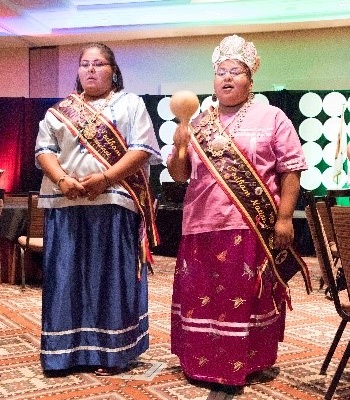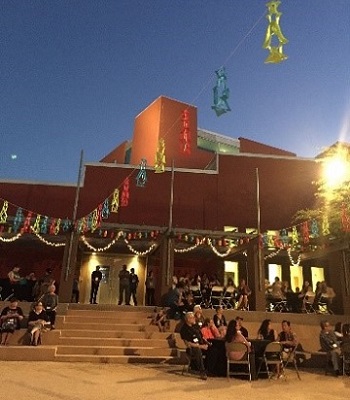Editor’s Note: Last month, IMLS staff participated in pre-conference grantee convening and other activities related to the 2016 International Conference of Indigenous Archives, Libraries, and Museums organized by the Association of Tribal Archives, Libraries, and Museums (ATALM). Office of Museum Services (OMS) staff reflect and share their learning and networking experiences in this short series of blogs.
By Laura Zamarripa
IMLS Program Specialist
The Association of Tribal Archives, Libraries and Museums hosted their annual meeting in Chandler, Arizona in early October, and I was happy to represent the Office of Museum Services as a co-presenter for two sessions. This was my first time attending, and it was a valuable opportunity to meet past and present Native American/Native Hawaiian Museum Services (NANH) awardees, many of whom presented on their projects.

The conference opened with blessings, storytelling, and O’odham Pee Posh songs of welcome. I believe music has the power to bring people together, and Miss Tohono O’odham Nation, Jaylene Wood, brought together 800 conference attendees in a heartbreakingly beautiful welcome song.
My strategy for selecting sessions was to focus on issues that potentially affect NANH awardees, or topics that are aligned to IMLS priorities. I thoroughly enjoyed a discussion moderated by Smithsonian National Museum of the American Indian staff member, Cynthia Chavez Lamar which posed questions to both panelists and audience members about professional development opportunities in the museum field for Native peoples. I found myself nodding in agreement to comments shared by younger people in the room, whose challenges seem similar to those I experienced more than 15 years ago as a first generation college student pursuing a career in the museum field.
That evening my IMLS colleagues and I enjoyed learning more about our gracious hosts from the Four Southern Tribes at the Huhugam Heritage Center. Again, I was struck by the similarities between our life experiences as I ate a hearty meal of homemade red chili and chumuth, which seemed not so different from my mom’s chile colorado and flour tortillas. We ended the night by “kicking up the dust” with a live band playing Waila, a social dance music from the region, as well as cumbias, a Colombian genre that made its way north by way of Mexico and the Sonoran desert. I couldn’t help but join in the fun as my mind flooded with memories of norteño music prominent at family gatherings, weddings and quinceañeras, or fifteenth birthday celebrations in my hometown.

During the second day of the conference, I learned how museum staff prepare for natural and man-made disasters with examples of actual emergencies and solutions to protect one-of-a-kind objects. It’s a tough job, and I developed more empathy for museum professionals who must prepare for the worst, and react accordingly when needed. I had time to attend one other session before preparing for the IMLS panel I co-presented, and appreciated the opportunity to learn about photography of collections and concerns affecting tribal museums. Huhugam Heritage Center collection and program staff provided several recommendations for working across departments and with their tribe to ensure collections are cared for appropriately.
Applicants to the NANH program are asked to include $2,000 in grant funds per award year in their project budgets, which are used to cover travel expenses to attend an IMLS designated meeting. The IMLS meeting often coincides with ATALM’s annual conference, and indeed several NANH awardees that I met told me that hearing about other projects and attending the ATALM conference were beneficial in their own project planning.
As the landscape around me here in the D.C. area transitions into fall colors and cooler temperatures, I’ll hang on to my memories of the Gila River Indian Community’s gracious hospitality with this photo that to me exemplifies the Southwest.
About the Author
Laura Zamarripa is a program specialist in the Office of Museum Services. She can be reached at lzamarripa@imls.gov